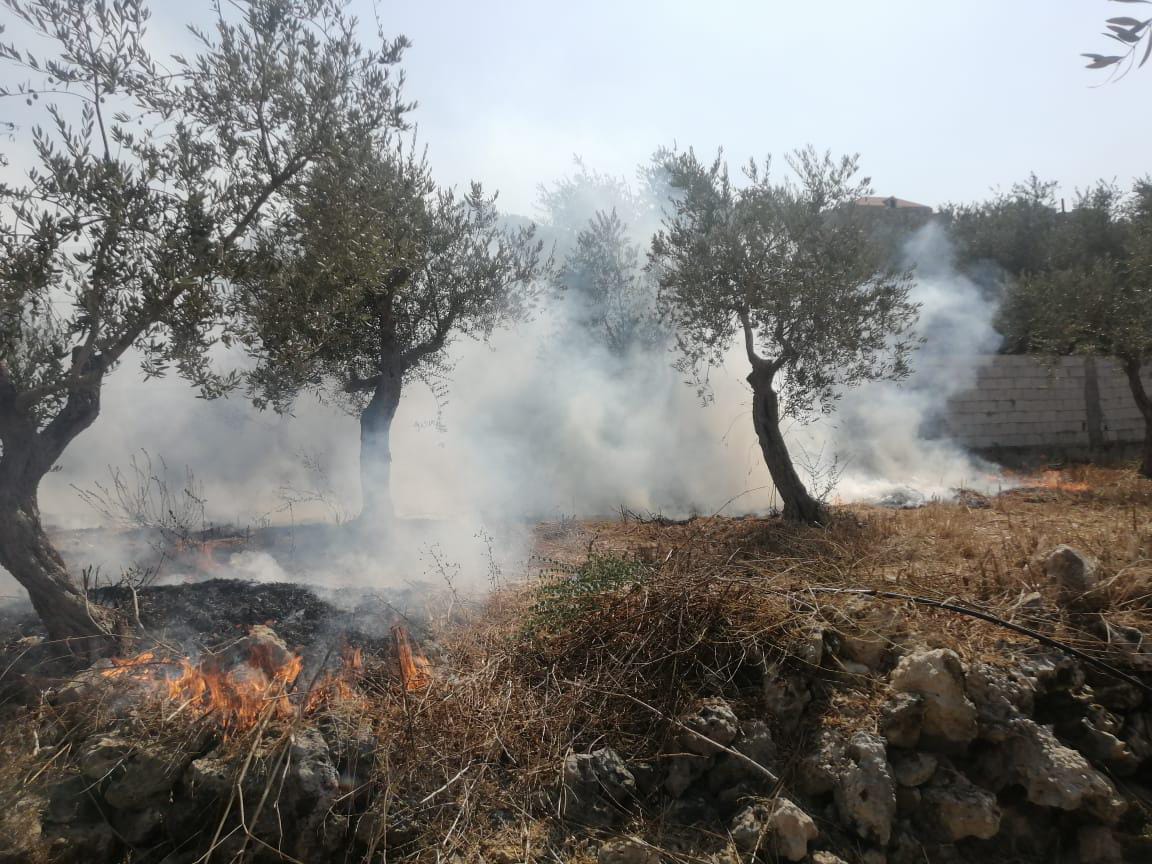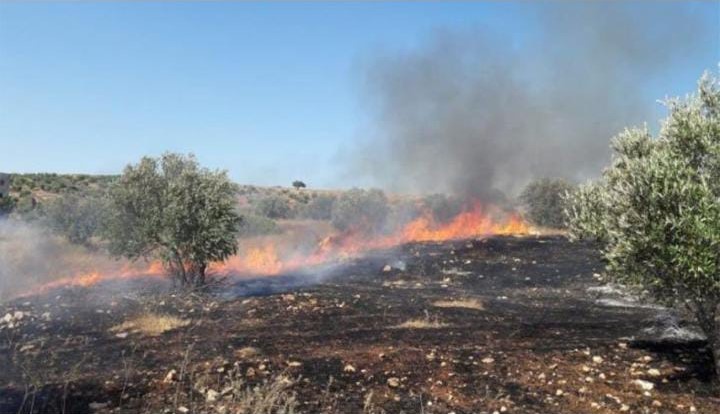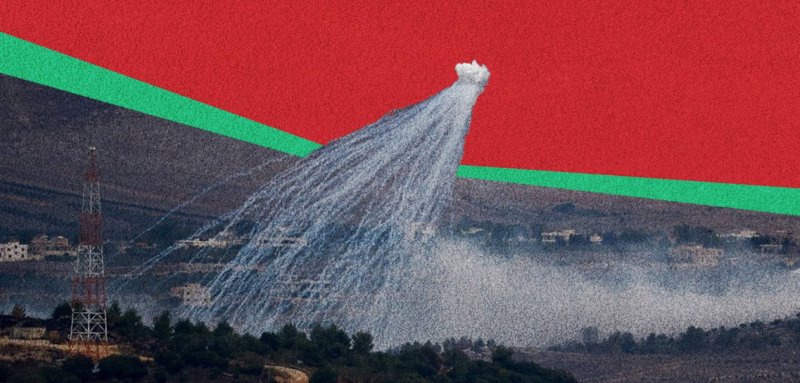"Misfortunes never come alone", begins Hassan Musa, an agricultural engineer from southern Lebanon, as he speaks to Raseef22, and mourns his fallen orchards. After years of enduring the effects of biological degradation, declining soil fertility, and significant nutrient depletion, Musa now watches, powerlessly, as his olive groves burn before his eyes, due to incendiary phosphorus bombing by Israel.
Musa is devastated, for not only has he lost a fruitful olive season, but he is unable to return to his orchards to inspect the damage inflicted on the land he has cultivated for the last 16 years.
Musa confirmed that Israeli forces have been bombing these olive groves daily for over two weeks, ensuring that no olive tree remains standing in defiance. Of course, it's not just Musa's groves; many of his neighbors' and relatives’ orchards and olive groves have also been targeted.
The real catastrophe, as Musa and many other farmers express to Raseef22, lies in the destructive effects this aggression will carry for many years to come. The white phosphorus bombs Israel drops on southern Lebanon have severe repercussions on the environment and plants in the region. White phosphorus is an extremely flammable incendiary substance, so when these bombs strike olive groves, they destroy a great number of trees.
The real catastrophe lies in the destruction that will be felt for many years .to come.
In addition to burning crops and trees, white phosphorus can remain embedded in deep soil for years, maintaining its incendiary and polluting properties, thus rendering the soil unsuitable for agriculture.
According to the United Nations Environment Programme, the pollution of ecosystems with phosphorus is a major contributor to biodiversity loss, and causes changes in the natural environment, including soil and water.
After years of enduring the effects of biological degradation, declining soil fertility, and significant nutrient depletion, olive fields in South Lebanon are now burning before the eyes of their owners due to incendiary phosphorus bombing by Israel
Tens of thousands of trees
According to statistics shared by the Lebanese Ministry of Agriculture, southern Lebanon’s olive trees account for 15% of and rank third in Lebanese agricultural production.
There are over two million olive trees in south Lebanon. Recent Israeli attacks have resulted in the burning of at least 40,000 olive trees so far – a significant loss to the Lebanese agricultural sector, of which olives make up 7%. Many other crops, including figs and grains, are also grown in south Lebanon.
In addition to the economic crisis that the Lebanese have faced since 2019, the residents of the South are now faced with a new crisis: the loss of olive oil season, a primary source of income for many. Southern Lebanese olive oil contributes a significant portion of the country’s market and consumption.
 Israel's illegal use of white phosphorus bombs on South Lebanon burns olive fields and has negative effects on the environment for years to come
Israel's illegal use of white phosphorus bombs on South Lebanon burns olive fields and has negative effects on the environment for years to come
Musa, who owns five olive groves covering fifteen dunums in the southern Hanine region near the village of Ayta ash Shab, with about three hundred trees across four acres. But he won't be able to benefit from or sell this season’s harvest– approximately fifty tins worth of olive oil. Even more concerning, is that Musa may not be able to benefit from the trees in the coming seasons either, as these are trees that require a long time to produce.
A deep sense of grief washes over Musa, since every year, swallows used to flock to his olive trees. But today, there are no trees, no birds, and no produce.
The phosphorus bombs incessantly raining down on Musa’s olive groves hinder civil defense forces from reaching the site and extinguishing the fires. With every morning and every intentional blaze, flames spread, from one orchard to the next. Beyond his own fields, his neighbor's fields have become a black barren land. As a result, Musa’s neighbor has lost fields-worth of avocado trees, and the income they would have ensured.
Long term implications include the guaranteed pollution of water in the region. Residue from white phosphorus bombs can infiltrate nearby water sources, as contaminated rainwater settles in riverbeds and water basins.
The significance of the olive tree
In addition to the detrimental economic toll of burned olive trees on the residents of south Lebanon, a new environmental catastrophe is unfolding. The incendiary bombs that are thrown eliminate the rich plant wealth represented by olive trees, thus eradicating one of the region's most environmentally beneficial tree species.
According to the Food and Agriculture Organization of the United Nations (FAO), trees (including olive trees) play a crucial role in mitigating the impacts of climate change. Each individual olive tree absorbs approximately 570 kg of carbon dioxide during its life, therefore contributing to improving air quality. Furthermore, the FAO suggests the possibility of using olive residue as biofuel for poultry farms, organic fertilizer for agricultural land, and feed for livestock.
Israeli attacks have burned 40,000 olive trees in south Lebanon – a huge loss to the Lebanese agricultural sector, of which olives account for 7%. The loss of these trees means the loss of olive oil season, a primary source of income for many in the South.
Olive trees are remarkably resilient to drought conditions, making them a sustainable choice in regions with limited water supply. Furthermore, they contribute to biodiversity, providing a habitat for various organisms, such as insects, birds, and mammals. Olive cultivation not only supports the local economy, it is beneficial to the local ecosystem.
 Israel's illegal use of white phosphorus bombs on South Lebanon burns olive fields and has negative effects on the environment for years to come
Israel's illegal use of white phosphorus bombs on South Lebanon burns olive fields and has negative effects on the environment for years to come
Long-term impact
Through its intentional destruction of olive groves through its incendiary bombing and use of phosphorus, Israel is devastating Lebanese soil, air, water, and environment as a whole.
Environmental expert Dr. Duaa Salim tells Raseef22 that these bombs, composed primarily of phosphorus, directly contaminate the soil and eradicate biodiversity. Just one bomb is enough to destroy a significant number of plants and animals.
Long term implications include the guaranteed pollution of water in the region, according to Dr. Salim. Residue from white phosphorus bombs can infiltrate nearby water sources, as contaminated rainwater settles in riverbeds and water basins.
However, the biggest disaster, according to Dr. Salim, will be the subsequent mass death of waterfowl and the complete elimination of marine diversity and fish wealth. When white phosphorus and oxygen particles interact in water, the result for marine life is deadly.
The same occurs in air; white phosphorus is quick to react to oxygen in the air, resulting in severe pollution and contamination, especially in the surrounding area immediately after the bomb explodes.
The burning of olive trees is an ecological disaster. Each olive tree absorbs 570 kg of CO2 during its lifetime, contributing to improving air quality. They are also resilient to droughts, making them a sustainable choice in regions with limited water supply.
In addition to its severe environmental impact, the use of white phosphorous bombs also poses health risks. According to a number of human rights reports, individuals exposed to white phosphorus can suffer from respiratory issues, organ failure, and other debilitating injuries, including burns that are extremely difficult to treat, and cannot be extinguished with water.
In light of the ongoing Israeli attacks – in violation of all international agreements, prohibiting the use of such chemicals and the infliction of harm on civilians and civilian infrastructure – Lebanon now must consider how best to move forward, and rehabilitate the environment in the affected areas. This will include improving the soil and water quality and restoring biodiversity, in order to mitigate the long-term implications of Israel's attacks.
Raseef22 is a not for profit entity. Our focus is on quality journalism. Every contribution to the NasRaseef membership goes directly towards journalism production. We stand independent, not accepting corporate sponsorships, sponsored content or political funding.
Support our mission to keep Raseef22 available to all readers by clicking here!
Interested in writing with us? Check our pitch process here!





